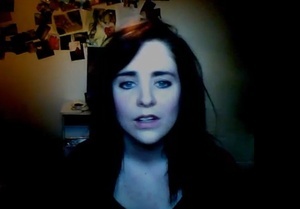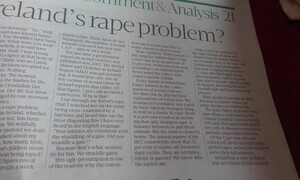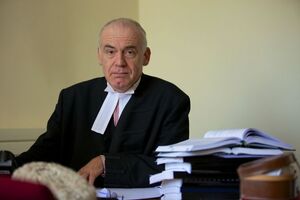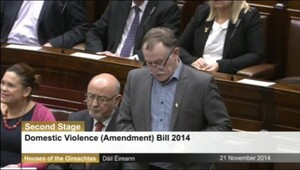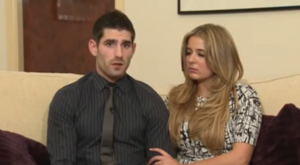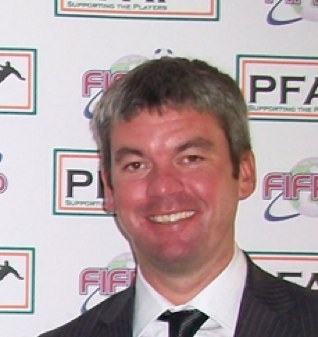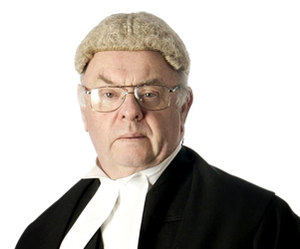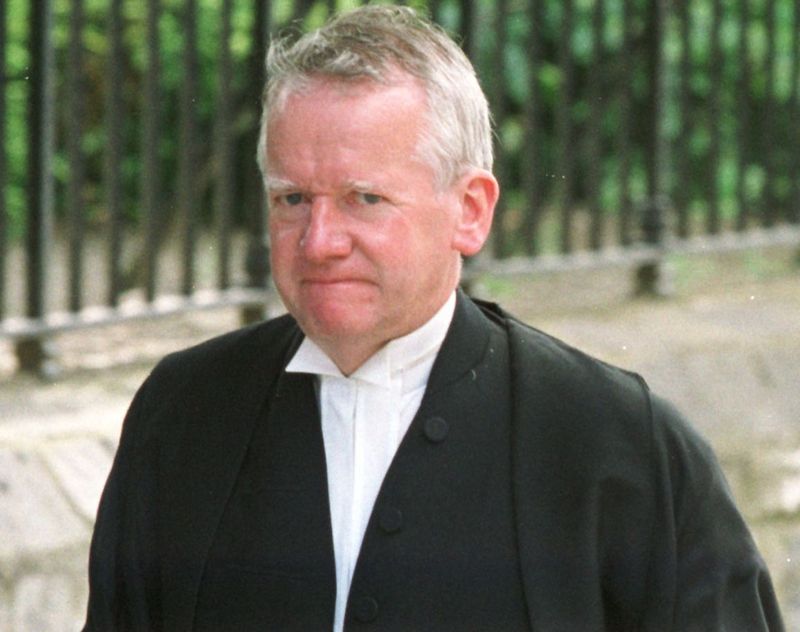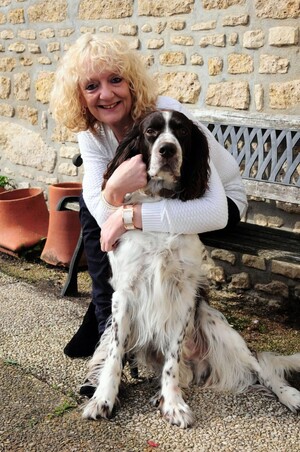
Former Fine gael Senator Niamh Cosgrave and her French Spaniel
This morning former Fine Gael Senator Niamh Cosgrave, who’s been living in Chef-Boutanne, in the west of France, since 2007, spoke to Seán O’Rourke about how she was raped almost two and a half years ago.
Earlier this month, her attacker, serial rapist Christian Gladieux was jailed for 18 years. He was also sentenced to a further 10 years of psychiatric supervision on his release.
Sean O’Rourke: “Tell me what happened?”
Niamh Cosgrave: “Like everybody else, my door was open. I have a French spaniel and I have a handle on my backdoor and he’s able to open that door himself. I’m very lazy. If I go to bed, I don’t want to be woken up to let him out. So I’d gone to sleep, I don’t think I was that much asleep because when I felt a tap on my shoulder, I woke up quite normally. It wasn’t a deep, deep sleep. I immediately assumed it was the dog so I didn’t panic. I turned around and then I felt a hand on my head. And my head was pushed down and all I could see were tracksuit bottoms and a pair of runners. So I automatically assumed that this was a child, maybe some child that was in trouble or maybe some child that had come in to rob me. But then he made some gestures that made me believe that yes, I was in serious trouble here. I went into auto mode. I didn’t believe this was happening and I thought, ‘right how can I get away from this, how can I stop this?’ and I tried to talk him out of it. I asked him for a cigarette. The ironic thing is I’d been off cigarettes for three weeks. He gave me a cigarette, he rolled the cigarette for me but then I tried to delay the cigarette as long as I could. But then I knew I was in trouble when he held out his hand and he said, ‘put that cigarette into my hand’. And I thought, ‘I’ll burn him if I do that.’ And then I noticed the cigarette was out and he put it into his pocket. I then realised, this guy is covering his DNA and that he knows what he’s doing, he’s done it before, I really need to make an effort to escape here, I’m not going to talk him out of it. So I asked if I could go to the toilet and he said, yes. And he walked ahead of me and we got into the corridor, I knew that that kitchen door was open and I thought if I go back down into that bedroom, I mightn’t come out of it. And I went to run. And he turned around and broke my jaw.”
Sean O’Rourke: “He what? He struck you?”
Cosgrave: “He literally swung around and with the impact of his fist on my jaw, he broke it. And I knew it was broken because I could actually feel the click. And the pain was absolutely horrific. I’ve given birth to four children and I’ve never experienced pain like that before in my life. He then… I still tried to run away but he grabbed my by my hair, threw me to the ground and I was fighting, fighting, fighting because I knew if I had gone down that corridor, I wasn’t going to come back out of it alive. He eventually got me into the bedroom and, yes, he raped me and he raped me repeatedly. At one stage I tried to lean over because the photograph of my children was on the bedside locker, to turn the photograph down. I know it sounds strange but I felt they were in the room with me and they were looking. I felt their presence in the room and I felt humiliated and I felt disgusted. I tried to turn that photograph down and he said, ‘don’t bother, you’ll never see them again.’ Eventually, it was strange… people think of rape as being a sexual act but the amount of violence was horrific. In fact it got so bad that I no longer felt any pain and I divided in two. It was like I was looking at a horror film and I think, in some way, that saved my life because rape isn’t about sex, it is violence and he was particularly violent. I don’t know what was going on in his head but he was playing out some sort of sick fantasy. The only thing I could do was pretend to be dead. And I don’t know where I got the willpower to just lie there. But, as I divided in two, I don’t know what happened. I just stopped feeling pain and, eventually, when he’d finished, he’d said something strange like, ‘I’m going to Paris’. At that stage, I was convinced, he’s gone to find a knife. He can’t have done all this to me and leave me alive. And I lay there for I don’t know how long.”
O’Rourke: “Yeah and in addition to saying you acted as though you were dead, were you fearful that you were actually going to die?”
Cosgrave: “I knew I was going to die, I knew I was going to die. That’s exactly how I felt. What he was doing to me was so bad, I honestly did not think that he could leave that house without killing me.”
O’Rourke: “Did he, apart from saying things to you about, you know, you’re not going to escape or whatever, he said something as well, I think when you were trying to get the picture, to turn it down, did he say very much?”
Cosgrave: “No. In fact, the first question I asked him was, ‘why me?’ He said, ‘I think you’re a beautiful woman’ and I said to him, ‘well, this isn’t how you meet women’. And he didn’t answer that. The one thing I did notice was, in France and the French language, you have the ‘vous’ and the ‘tu’. ‘Vous’ is for when you’re being very formal with people but he was using the ‘tu’. And even though I couldn’t see him, didn’t recognise him, I got the impression he had seen me and felt familiar enough to [use] ‘tu’. He didn’t say much but he did answer my questions.”
O’Rourke: “How long did this ordeal go on for, Niamh?”
Cosgrave: “I went to bed at about I’d say quarter to 11, 11 o’clock, I’d organised a dinner party the next evening and the Gendarmerie report states that I rang the Gendarmes at about 2am so I, I would say he probably left the house, 10, 15 minutes maybe, it lasted I’d say about two and a half hours.”
O’Rourke: “He said he was going to Paris or something like that, something to that effect.”
Cosgrave: “Something strange, something weird, it came out of nowhere.”
O’Rourke: “And did he tell you not to do anything, not to, to stay in the room or…”
Cosgrave: “He said, ‘you stay there and don’t move’ and he left. But because he was wearing runners I couldn’t hear a door opening or closing, I couldn’t, I didn’t know where he was, I didn’t know whether he was still in the house or what. But, I lay there for a while and then I got this adrenalin rush, I can’t describe it. It was like, “I’m not going lie here and wait for this”. So I crawled out, I could barely move, the injuries were that bad but I crawled out to the kitchen. I did have a camera. And, I was tempted to switch it on the front drive but I was afraid if the light came on and he saw it, and he had left the house, that he’d come back. So I grabbed the phone and went running back down into my bedroom and when I rang the Gendarmes, I didn’t get through immediately, all I could hear was the music, asking me to wait and I remember hiding the mobile phone, in case he was in the house and realised I’d called the Gendarmes. And I thought, well, if he’s gone, at least it’s over. But, unfortunately, Sean it wasn’t over. Because the police arrive, the Gendarmes, they arrive with dogs, your house is no longer your own, your body is no longer your own, you’re covered in plastic, your bedroom is taped off, it’s like you’re still a bit of meat, you’re still a bit of property.”
O’Rourke: “Presumably, you got serious medical attention very quickly?”
Cosgrave: “Absolutely, in fact, the Gendarmes, they were in the house, I’d say a few minutes, very basic questions and they said, ‘we’re calling an ambulance’. And, like and idiot, I was like, ‘well why, why?’ I said, ‘I need to get dressed, I need to have a wash’ and they said, ‘no, you can’t, you can’t, you’ll have to go the way you are now’. So the ambulance arrived but from the minute I arrived at that hospital and I saw that wonderful Gendarme, dressed from head to toe in uniform and he just said, ‘yes, we’re going to do some examinations and we are going to catch that man’ and I felt safe and I felt secure.”
O’Rourke: “How long did it take for him to be caught?”
Cosgrave: “In fact he was caught the next day. After the operation, they asked me to do a photo profile on a computer. I said, ‘really, there’s no point’. And they said, ‘try it, try it, just you’d be amazed at what you’ll remember’. So it started by describing his hair and his face and before I knew where I was, we had his description and I said, ‘yes, that’s him’ and they immediately sent that the Gendarms in Chef-Boutonne who recognised him. The unfortunate thing is it took three weeks because, all, I discovered afterwards, although they knew who this was and because it was serious, they wanted to make sure that all the DNA matched up because when they did the tests, obviously, they did them three times – once for the Gendarmes, once for an independent body and once for me. And they wanted to make sure that every bit of that added up. He was also on the Sex Offenders’ List because he’d done this before.”
Later
O’Rourke: “Could you have chosen, in the court process, over there, to have remained anonymous and not to be identified?”
Cosgrave: “In France, you can ask for what they call is a closed court. However, my solicitor had said to me, given the gravity of the situation, there was a very real risk that the judge might go for a partial [closed court]. But, as he said to me, you know, everybody knows and it will be in the papers, even with the [closed court], ‘victim Irlandes’. I’m the only Irish woman in that town, my anonymity, my ability to remain anonymous was gone anyway.”
O’Rourke: “But you had a particular reason for speaking out didn’t you?”
Cosgrave: “Well, absolutely because this feeling of having reported him, I felt, until that case came up, I felt like a dirty little secret. I felt that rape was a dirty little secret and that’s what an awful lot of victims, I think, feel. They feel humiliated and they live in fear and they live in secrecy and their lives are destroyed. One of the things I wanted to get across is that, ‘yes, you can report these things, yes you will get the help you need. And yes you can do some good’ and it’s been amazing for me since. It’s been absolutely. I can’t, it’s my birthday when I think..”
O’Rourke: “What do you think lies ahead for you then, for the rest of your life, now that you, I won’t say that you’ve put it behind you but at least you’ve seen that..”
Cosgrave: “My counsellor said I will never forget it but I will learn to live with it and when I saw him in handcuffs I realised, ‘yes I can learn to live with it’.”
O’Rourke: “Needless to say we’ve had an avalanche of texts and messages of support, ‘beyond brave, what a woman’, ‘hope she has all he peace and…pardon me…it’s just, I think it’s so moving to listen to you, Niamh.”
Cosgrave: “I want to thank those people for saying that, too. That means a lot to me.”
Listen back in full here
Related and pic via: I Faced Down My Attacker I felt I had Power Again (Maeve Sheehan, Sunday Independent, February 22)
Dublin Rape Crisis Centre: 1800 77 88 88


